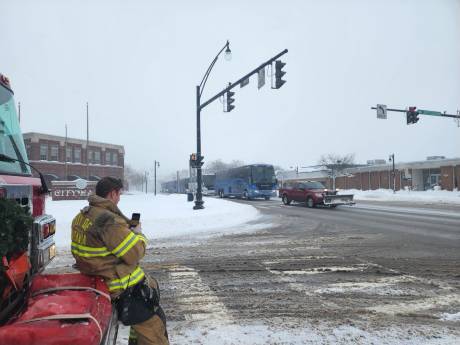This is a story that should be told in black and white, like an old Hollywood screen gem about a Christmas miracle, the small town banding together against adverse conditions, saving a bunch of strangers from some dread uncertain fate as the winds howled and the snow blew on a moonless night.
But you won't find this story on Turner Classic Movies.
This story doesn't star Jimmy Stewart.
This is the story of the Town of Alabama responding to an unexpected crisis caused by an epic storm, some unplanned turns prompted by current technology and a few broad assumptions travelers made about what to anticipate down the road.
The central characters are Joe Bradt, Brian Kotarski, Craig Alexander, and Bonnie Woodward, along with a supporting cast of rescue crews and of Alabama residents who donated blankets, air mattresses and toys to help about 140 people from all over North America who found themselves stranded in their small town during the most powerful blizzard to hit Western New York since 1977.
Our setting is a wood-framed, two-story building that has provided warmth, comfort, and perhaps a few libations to weary travelers for 182 years. That's why it's still called the Alabama Hotel.
That word hotel might explain why, when motorists found they could go no further in the midst of Winter Storm Elliott, they came to the intersection of Lewiston Road and Alleghany Road seeking shelter.
That's where they found Bradt willing to open the door to all who knocked.
"I would say that 80 percent of the people that walked through the front door, the first question was, 'Do you have any rooms around?' And I'm like, 'We're not really a hotel. We're a restaurant, but come in, let us feed you and let us keep you warm,'" Bradt said.
I'll Be Home for Christmas
Friday was supposed to be a regular work day for Bradt, Alabama Hotel owner Bonnie Woodward, and the rest of the staff, except that it would be the last day before closing for the week for Christmas and New Year's.
Bradt, the restaurant's general manager, got a call from Woodward as he drove to work on Friday morning. She wanted to discuss the forecast. She asked Bradt, "what are your thoughts?"
"I said, 'Man, I don't know. You know, last time, they weren't right about the forecast, but it doesn't sound like they're playing around.'"
For the safety of their employees, Woodward and Bradt decided to keep the doors closed on Friday and reopen as planned on Jan. 4, so Bradt continued on to work and proceed to secure the building and supplies for the planned closure.
When he was done, "I loaded up the Jeep with my Christmas dinner and Bonnie's Christmas dinner, which I was going to drop off at her house, and left here about 12:30. I didn't get a quarter mile up the road, and there was no visibility. The roads were completely covered, and there was already an accident right here.
"I immediately turned around and said the safest place I can be is here for now. You know, I'll just wait it out here. No sooner did I put the key in the back door and unlock the back door than people were knocking on the front door. That didn't stop for two days."
The weather outside was vicious. Heavy, lake-effect snow blown around by 35 mph winds with 70 mph gusts. The roads were no place for anybody in any type of vehicle, let alone people unfamiliar with the area in sedans, minivans and luxury SUVs.
But when the Thruway authority decided to close the I-90 with no plan to direct travelers to safe routes, and Google and Apple proving incapable of warning drivers of hazardous conditions ahead, drivers who plotted Canada into their smartphones did what Siri or Googlebot told them to do: hop on Route 63 or Route 77 and head toward Niagara County. Right into the worst of the blizzard.
They didn't get far.
Buffeted by high winds and snow moving vertically across their windshields, drivers couldn't see the end of their hoods, let alone the roadway, and motorists became stranded up and down the state highways (if this were a black and white movie, we would mention "hood ornament" and cut to a shiny chrome object weaving through a field of white while trombones honk ominous tones).
Holiday Inn
Some made it on their own as far as Lewiston and Alleghany. Others were brought there by rescue teams or area residents. All of them were a lot better off sheltered from the elements with hot meals and warm blankets.
Shortly after Bradt opened the doors to all who showed up on the restaurant's front porch, he was joined by Brian Kotarski, who lives just a bit more than a mile down the road but thought that as long as his wife and small children had power, they were safe, and he wouldn't necessarily be safe if he tried to make it home, and his friend Joe and all these people at the Alabama Hotel needed help.
Kotarski has no training in the hospitality industry. None. Nada. He owns a construction company.
"I've never cooked," Kotarski said. "Never. I've always been on the other side of the bar or in the dining room. It was definitely a new experience, you know, cooking on the grill and serving at the bar. You know, I've never done that before."
But he quickly became Bradt's right-hand man.
They were joined by Craig Alexander, the co-owner of Holly Farms, the small grocery store across the street famous for its meat counter.
For the next 48 hours, the three of them led the effort to keep all of the unexpected visitors well nourished.
Bradt said they started off with a buffet of chicken and biscuits because that was something that could be put out quickly and was an easy self-serve meal, giving them time to plan their next move.
They made chili for dinner, another easy meal.
"We didn't sleep over that whole 48 hours," Bradt said. "When everybody settled down that first night, we dimmed the lights at probably 11 o'clock and Brian and I walked in the kitchen and were like, 'hey, what's next?' And next is breakfast. And we're like, what do we have? So we started going through the freezer. We pulled 20 pounds of bacon, 20 pounds of sausage, Brian stood over the grill and made 350 pancakes. When these guys got up between six and seven, we had the buffet set up."
There was no worry about supplies, Bradt said. Not only was the restaurant well stocked, but with Alexander's help, there was a ready pantry of meal ingredients less than 50 yards away.
"He didn't even think twice," Bradt said. "Like, 'what are we going to eat next?' 'Roast beef.' 'I'll be right back,' and he goes next door and comes back with 40 pounds of roast beef. Those guys were a godsend to us."
Alexander is on the quiet side, and when interviewed, he said he was happy to help and "it was a fine Christmas."
It's a Wonderful Life
Everybody that made it to Alabama Hotel signed in so there would be a record of who was safe in case somebody wanted to go looking for them. Looking at that list, Bradt notes, "there are people from Canada, New Jersey, Niagara Falls, LA, Toronto, Ohio, Delaware; there's a few from Shelby and Oakfield and Lancaster, but 75 percent of the people that were here were from out of the state."
There was never a thought about charging these travelers for lodging, such as it was, or food.
Bradt doesn't have an exact estimate of how much serving all those people, all that food, cost the restaurant. He's told national media outlets -- yes, the Alabama Hotel's Christmas hospitality has become national news -- it cost about $5,000. He said the price is somewhere between $4,000 and $6,000. But who's counting?
The lodging consisted of people pulling chairs together to sleep on, or sleeping on the floor or finding space upstairs. Families with kids got the somewhat remodeled rooms upstairs, including the ones with a couple of couches.
Blankets and air mattresses came courtesy of a few of the residents in the hamlet.
"One lady down the street, she put on her snowsuit, she grabbed two sleds out of her garage, and she strapped totes and bags of blankets and air mattresses to them," Bradt said. "She literally came with flashlights on her forehead, trudging through the blizzard right up to our front door and was like, 'Here's some supplies.' That continued on for the whole two days. Just random people walking here with supplies."
When travelers didn't have blankets, they grabbed eight-foot long table cloths.
"I've never seen so many people from so many different nationalities in one place," Bradt said. "And all they cared about was each other. There was no politics. There was no arguing. There was no fighting. It was just, 'how do I help the person next to me?'"
Kotarski added, "It's pretty humbling to have that many people, no arguments. If somebody needs something, somebody figured it out."
There were two Canadian families with teenagers who became the bus and wait staff.
"They pitched in as if they knew me and Joe forever," Kotarski said. "They were washing dishes, cleaning up out here. I mean, there was one burden we didn't have to worry about. They catered to everybody. They made coffee the whole time, tea the whole time."
Bradt interjected, "The only time they came to us was to ask, 'where is this? Where is more toilet paper? Where is more coffee?'"
If you've followed the story this far, you may have noticed the meals being prepared were pretty heavy on meat -- chicken and beef. That's our next plot complication. In a group of travelers, not everybody is going to eat animals.
That soon became another problem that solved itself.
"Somebody came up and said, 'We're from Canada, and we're Indian, and we are vegetarians,' Bradt said. "And I'm like, I am not a chef. I'm not sure what to make. So we opened the salad bar. They're saying, 'Hey, what do you have for vegetarian options? And I said, 'What I have is I have a lot of ingredients.' And they were like, 'do you mind if we come back there and cook?' It was absolutely mindblowing. Mindblowing."
Yes, Virginia, there is a Santa Claus
When Christmas Eve rolled around, Bradt mentioned to an Alabama resident that they had 10 kids in the group. Pretty soon, people were showing up with wrapped presents, wrapped toys, so the kids would have something to open on Christmas morning.
Woodward didn't venture from her home during the storm, but Bradt stayed in contact and let her know what was going on, and on Christmas Eve, he wondered what he should do for their patrons.
"I called her at about 4:30, and I said, 'Listen, we've served chicken and biscuits. We've served chili. We've served pizza. We've served wings, breakfasts, roast beef, I mean, you name it, we served it.' I said, 'Well, how do we make Christmas Eve special for 115 people that are here together? And she said, 'I want you to walk out to our walk-in cooler and I want you to take out the 60 pounds of prime rib that is in there. I want you to make a prime rib dinner.'"
So that's what Bradt did.
"We didn't just make prime rib and throw it out there," Bradt said. "We made it special. We served them. I stood right there at the end of the table and carved the prime rib as each person came up, and the first thing they did was stop and take a photograph. Everything we did, there was clapping and excitement, and we just really made the best of it, you know, absolutely made the best of it. It's definitely a Christmas that none of us -- that none of them -- will ever forget."
At about 3:30 in the morning on Christmas Day, Bradt ventured out and could see things were starting to clear up, and he knew that pretty soon it would be time for him and all these people who had bonded over meals at the Alabama Hotel to head home.
In the morning, Bradt started giving people a ride in his Jeep to the travel center, to Oakfield-Alabama, to side roads, wherever their cars were parked. When he dropped them off, they would try to stuff money in his pockets. He would refuse but they would persist.
"I got home and started talking to my family, and I was like, 'oh, yeah,' so I started emptying my pockets out onto the dining room table."
He counted $1,700.
There was another $300 left in the restaurant's tip jar.
"I called Bonnie, and I'm like, 'this isn't my money,' Bradt said. "This money is coming back to the restaurant, and we're gonna find a way to use it. On the way here today, I was thinking, 'You know what, maybe we use some of that money to go out and buy 100 blankets, you know, and set up upstairs so we can be prepared.' Hopefully, we never need them."
Then his thought shifted.
"It's been a very, very humbling, very humbling experience. These are the times when you figure out who your friends are and who's got your back."
And that's how the story ends, it seems, with more than 100 holiday travelers who passed through a small town in Upstate New York on Friday and Saturday to find out that total strangers can be their friends just when they might need them the most.
Photos: Inset photo of Joe Bradt and Brian Kotarski by Howard Owens. All other photos courtesy of Alabama Hotel.
A message left on a social media post by Alabama Hotel.
















































